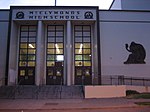California Hotel
1930 establishments in CaliforniaAfrican-American history in Oakland, CaliforniaAfrican-American segregation in the United StatesBuildings and structures in Oakland, CaliforniaHistoric hotels in the United States ... and 5 more
Hotel buildings completed in 1930Hotels established in 1930Hotels in the San Francisco Bay AreaMusic venues in the San Francisco Bay AreaResidential buildings in Alameda County, California

The California Hotel is a historic Oakland, California, hotel which opened in the early days of the Great Depression and became an important cultural center for the African-American community of San Francisco's East Bay during the 1940s, 50s and 60s. On June 30, 1988 the hotel was placed on the National Register of Historic Places.
Excerpt from the Wikipedia article California Hotel (License: CC BY-SA 3.0, Authors, Images).California Hotel
San Pablo Avenue, Oakland
Geographical coordinates (GPS) Address External links Nearby Places Show on map
Geographical coordinates (GPS)
| Latitude | Longitude |
|---|---|
| N 37.8261 ° | E -122.2785 ° |
Address
California Hotel
San Pablo Avenue 3501
94608 Oakland
California, United States
Open on Google Maps






